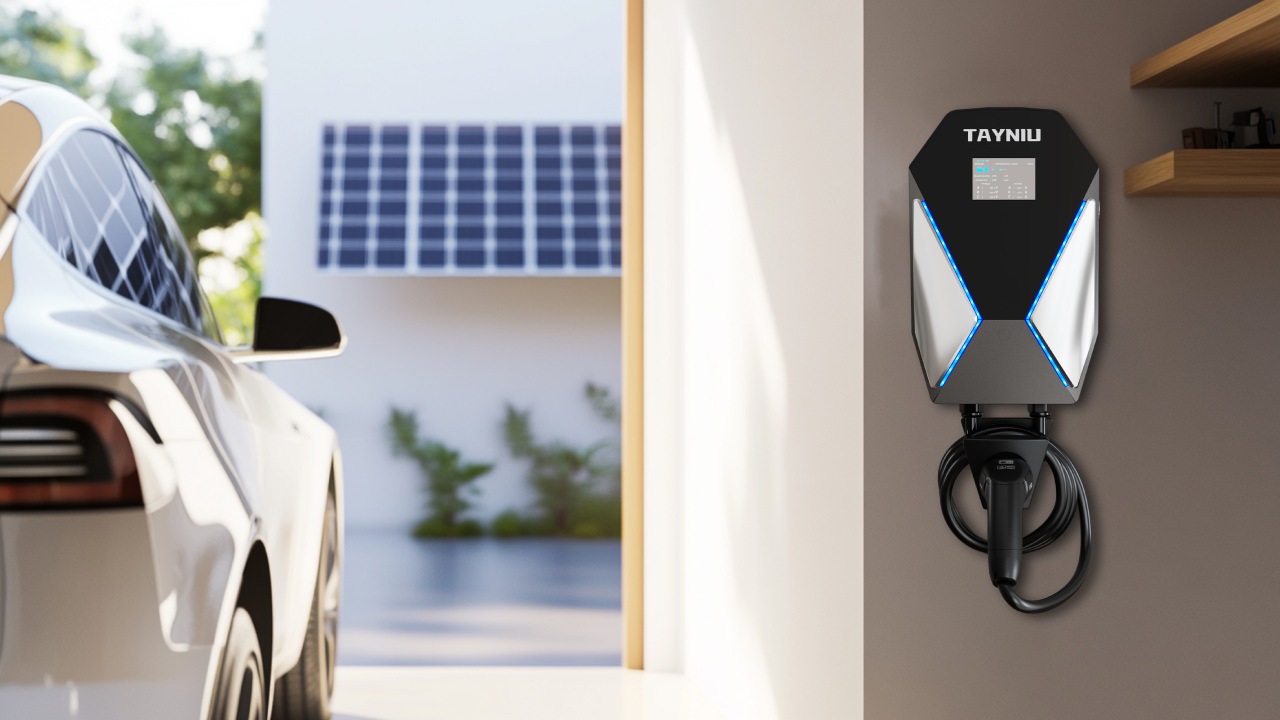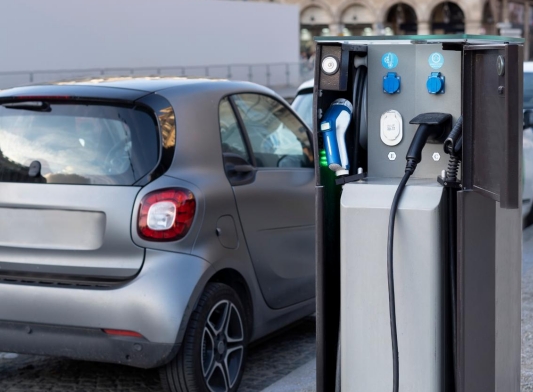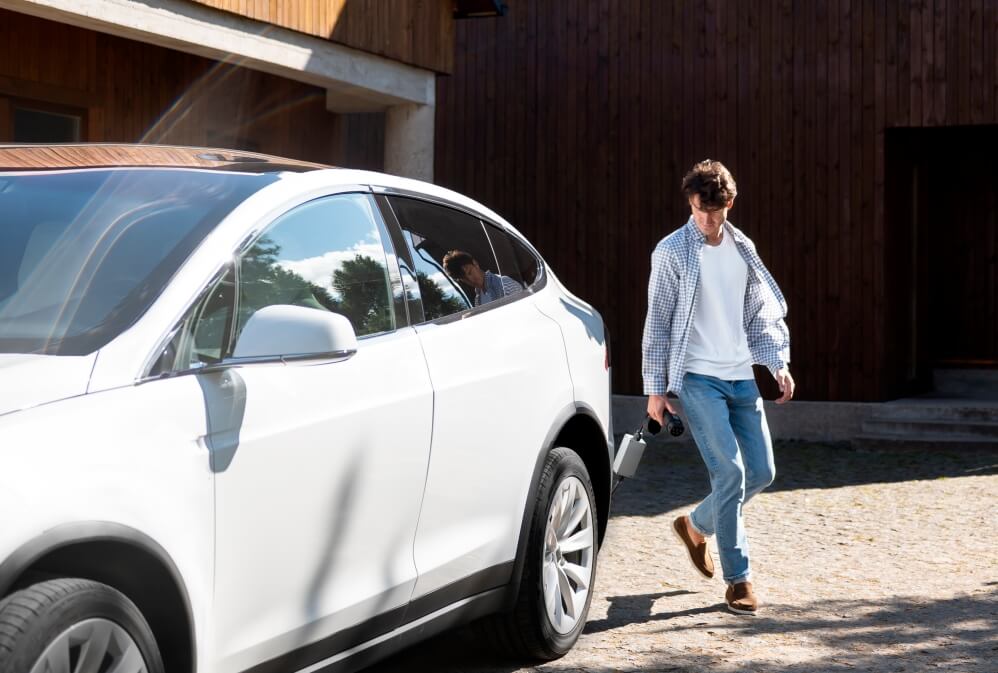Can Solar EV Chargers Revolutionize Home Charging?
The transition to electric vehicles (EVs) is not just about greener roads; it’s about rethinking how we power our lives. As the world embraces renewable energy, solar EV chargers are emerging as a game-changer, promising eco-friendly and cost-effective home charging solutions. But can these chargers truly revolutionize how we charge our cars at home? Learn more about Tayniu’s mission and expertise on our About Us page. Let’s dive into the potential and challenges of this innovative technology.
Understanding Solar EV Chargers
A solar EV charger combines two powerful technologies: solar energy and electric vehicle charging. These systems use solar panels to capture sunlight, convert it into electricity, and channel it to charge your EV. Depending on the setup, this electricity can be used immediately or stored in a battery for later use.
There are two primary types of solar EV chargers:
- Standalone Systems: Independent systems that operate off-grid, often paired with battery storage.
- Grid-Tied Systems: Connected to the local power grid, allowing for energy exchange and ensuring reliable charging even during low sunlight.
By harnessing the sun’s energy, a solar EV charger offers a sustainable alternative to conventional electricity, aligning with the growing demand for cleaner energy.

Why a Solar EV Charger is the Future of Home Charging
Cost Savings
One of the most compelling reasons to adopt a solar EV charger is the potential for long-term cost savings. While the initial investment in solar panels and installation can be significant, the ability to generate your electricity reduces reliance on the grid, slashing monthly energy bills. Over time, the savings can outweigh the upfront costs, especially in regions with high electricity rates.
Environmental Impact
Switching to a solar EV charger drastically reduces your carbon footprint. Using renewable energy to charge your vehicle contributes to a cleaner planet, reducing greenhouse gas emissions associated with traditional electricity generation.
Energy Independence
Solar EV chargers can provide a level of energy independence. For homeowners with battery storage, they offer a reliable power source during outages, ensuring your EV is ready to go when you need it most. This independence also means less vulnerability to fluctuating energy prices.
Challenges to Widespread Adoption
Despite their benefits, solar EV chargers face several challenges:
- Initial Costs: Solar panels, inverters, and installation costs can deter many potential adopters. While government subsidies and incentives can offset these expenses, the upfront investment remains a significant hurdle for some.
- Space Requirements: Solar panels require adequate space, typically on a roof or in an open area. Not all homes have the necessary space or ideal conditions for optimal solar energy generation.
- Efficiency Concerns: Solar energy production varies based on weather, location, and the time of year. Efficiency may be a concern in areas with limited sunlight or frequent overcast conditions.
- Integration with Existing Infrastructure: For fixed home charging options, explore Tayniu’s Wallbox Solutions. For homes with older electrical systems, integrating a solar EV charger may require upgrades to the existing infrastructure, adding to the overall cost and complexity.
Innovations Driving the Solar EV Charger Revolution
Advancements in technology and supportive policies are making solar EV chargers more accessible and effective:
- High-Efficiency Panels: Modern solar panels are increasingly efficient, generating more power from the same amount of sunlight.
- Smart Energy Management: Systems that optimize energy use, storing surplus energy or prioritizing charging during peak sunlight hours.
- Government Incentives: Tax credits, rebates, and green energy programs are reducing the financial burden of adopting solar technology.
Real-World Applications and Success Stories
Homeowners and businesses across the globe are already reaping the benefits of solar EV chargers. For instance, a family in California integrated a solar EV charger with battery storage, achieving near-total energy independence while saving thousands on utility bills. Similarly, a small business in Germany installed a solar charging station for employees, reducing operational costs and supporting corporate sustainability goals. Companies can explore Tayniu’s Commercial EV Charging solutions to enhance their sustainability efforts further.
FAQ: Solar EV Chargers
Q: How much does a solar EV charger cost?
A: Costs vary depending on the size and type of system, but the investment can be significantly reduced with incentives.
Q: Can solar panels fully charge an electric car?
A: With adequate sunlight and the right system, solar panels can provide enough energy to charge an EV fully
Q: What is the ROI of a solar EV charger?
A: Most homeowners see a return on investment within 5-10 years, depending on energy savings and incentives.
Future Outlook
The future of solar EV chargers looks bright. As technology advances, costs are expected to decrease, making these systems more accessible. Innovations like vehicle-to-grid (V2G) technology could further enhance their value, allowing EVs to act as mobile energy storage units, supplying power back to the grid when needed.
In the coming years, solar EV chargers could become a standard feature of eco-conscious homes, transforming how we view and use energy.
Conclusion
Looking for expert advice on solar energy storage and home charging solutions? Contact Tayniu today for a free consultation and discover innovative, tailored solutions for your needs.
Can solar EV chargers revolutionize home charging? Their ability to deliver sustainable, cost-effective, and reliable energy solutions is the answer. While challenges remain, the benefits far outweigh the drawbacks, paving the way for a cleaner, greener future.
Are you ready to harness the power of the sun for your EV? The revolution starts at home.
Last Updated on January 3, 2025 by tayniu



